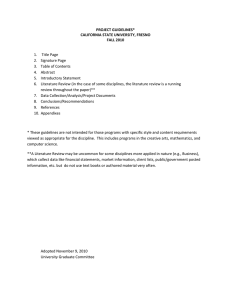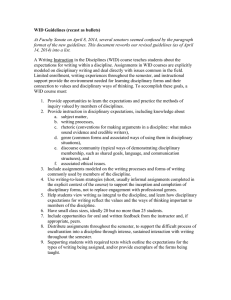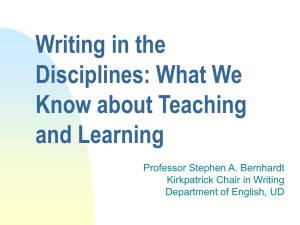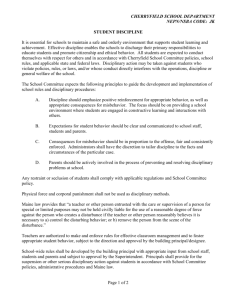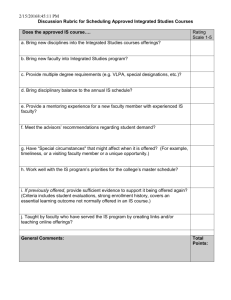Interdisciplinarity Study Group Notes from the meeting at 5.30pm on 28
advertisement
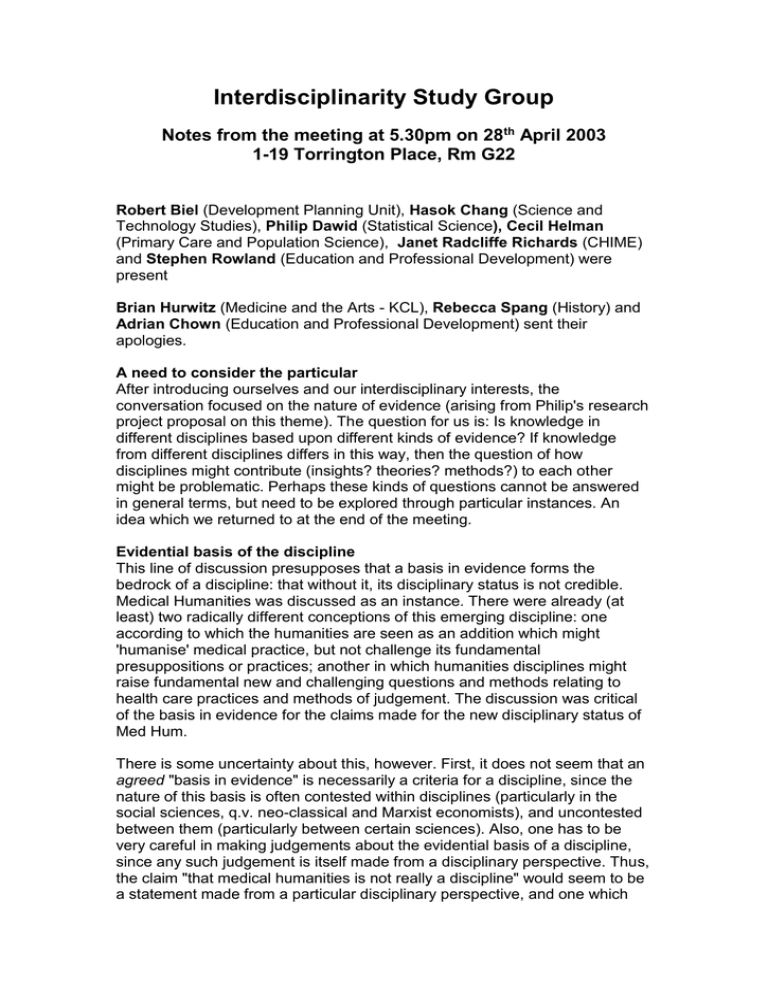
Interdisciplinarity Study Group Notes from the meeting at 5.30pm on 28th April 2003 1-19 Torrington Place, Rm G22 Robert Biel (Development Planning Unit), Hasok Chang (Science and Technology Studies), Philip Dawid (Statistical Science), Cecil Helman (Primary Care and Population Science), Janet Radcliffe Richards (CHIME) and Stephen Rowland (Education and Professional Development) were present Brian Hurwitz (Medicine and the Arts - KCL), Rebecca Spang (History) and Adrian Chown (Education and Professional Development) sent their apologies. A need to consider the particular After introducing ourselves and our interdisciplinary interests, the conversation focused on the nature of evidence (arising from Philip's research project proposal on this theme). The question for us is: Is knowledge in different disciplines based upon different kinds of evidence? If knowledge from different disciplines differs in this way, then the question of how disciplines might contribute (insights? theories? methods?) to each other might be problematic. Perhaps these kinds of questions cannot be answered in general terms, but need to be explored through particular instances. An idea which we returned to at the end of the meeting. Evidential basis of the discipline This line of discussion presupposes that a basis in evidence forms the bedrock of a discipline: that without it, its disciplinary status is not credible. Medical Humanities was discussed as an instance. There were already (at least) two radically different conceptions of this emerging discipline: one according to which the humanities are seen as an addition which might 'humanise' medical practice, but not challenge its fundamental presuppositions or practices; another in which humanities disciplines might raise fundamental new and challenging questions and methods relating to health care practices and methods of judgement. The discussion was critical of the basis in evidence for the claims made for the new disciplinary status of Med Hum. There is some uncertainty about this, however. First, it does not seem that an agreed "basis in evidence" is necessarily a criteria for a discipline, since the nature of this basis is often contested within disciplines (particularly in the social sciences, q.v. neo-classical and Marxist economists), and uncontested between them (particularly between certain sciences). Also, one has to be very careful in making judgements about the evidential basis of a discipline, since any such judgement is itself made from a disciplinary perspective. Thus, the claim "that medical humanities is not really a discipline" would seem to be a statement made from a particular disciplinary perspective, and one which might be contested from a different disciplinary perspective. The only way to avoid this problem is to have some notion of making judgements in a manner which transcends disciplinary boundaries. The nature of interdisciplinarity The discussion of these problems and the nature or what it might be to "transcend" disciplinary boundaries led to us wondering whether interdisciplinarity was itself a kind of discipline. There seemed to be two different views here; one, that academic work is (and should be) rooted within a discipline, but may attempt to draw upon what other disciplines might have to offer; a different view seemed to suppose that one might be able to somehow enter a different 'inter' or 'meta' disciplinary space from which it is possible to negotiate between disciplines. Someone working in such a space might be viewed as an 'interpreter' who was, in some way, able to translate (and appropriately transform?) ideas from one disciplinary context into another. The discussion of evidence led to questions of paradigms, and there was considerable discussion of scientific/quantitative methods in relation to other approaches. Some scepticism was expressed at the notion of "paradigm" (it was even suggested that those who use the term most are invariably those who don't work with one!) It was also suggested that the increased questioning of - or scepticism regarding the claims made for - science might lead to a distrust of science and that this was a significant factor in the emergence of such a discipline as medical humanities. An agreed agenda? While as a group we held differing views about a number of the themes discussed, it seemed that we shared an agenda. This agenda involves us in questioning the way in which work between disciplines has often been accompanied by a collapse in disciplinary integrity. While many of us would want to challenge the ways that disciplinary cultures can impose constraints that are inappropriate in some contexts, and in relation to tackling some problems, there is a danger of undermining all forms of disciplinary rigour if knowledge comes to be viewed as a commodity free from all disciplinary structures. However, any such statement is necessarily too general, vague and somewhat unhelpful in addressing actual problems of working in contexts where disciplines engage with each other. Plan for next meeting For this reason we felt that, as a next stage, we should attempt to address the question of interdisciplinarity from particular instances of interdisciplinary engagement. Such 'engagement' might be one in which disciplines clash with one another, or it might relate to instances of where they seem to work productively together. The purpose would be to explore the nature opf such clashes or productivity. The crucial thing, we felt, was that we should consider very specific instances rather than general questions. We agreed that we would each try to contribute such a specific instance to the next meeting of the group. I suggest that we really do take specificity and particularity to heart here. It might be very productive to look at, for example: an individual instance of interaction between people working across disciplines; a very specific problem within a project; a particular occasion on which a plan or proposal for interdisciplinary work has been enabled or blocked. Obviously, the context will always be important for understanding the particular, but I think it would be best to start with careful descriptions of particular instances. Date of next meeting 16th June 2003 5.30pm 1-19 Torrington Place Stephen Rowland 1 May 2003

